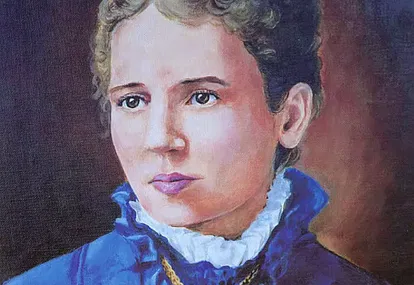ANNIE ARMSTRONG: THE “MASTERMIND” BEHIND WMU
March 5, 2021

Annie Armstrong is one of the most well-known names in all of Southern Baptist history. Born in Baltimore on July 11, 1850, Annie spent most of her life working from her hometown. Converted as a young woman in 1870, she was drawn to missions work and joined her mother in zealous Christian service. She served in numerous ministry capacities during her life and was especially passionate about serving the poor and advocating for social justice.
In 1888, Annie was a key part of the formation of Woman’s Missionary Union (WMU). She knew that missionaries desperately needed support and that local churches needed missions education, so she called on her fellow Southern Baptist women to mobilize. Annie was intimately involved in WMU’s first days, even co-writing the official by-laws with her sister, Alice. When it came time to elect a leader, Annie was the obvious choice. She was chosen to become the first recording secretary (now executive director) and threw herself into building up WMU.
PROMOTING CHURCH INVOLVEMENT IN MISSIONS
From day 1, Annie was a force to be reckoned with. Her goal was simple: promote local church involvement in missions through fund-raising and education. To achieve this goal, she started WMU’s publication efforts and helped design the organization’s business structure. Under her leadership, WMU developed a fund-raising system that brought in thousands of dollars per year, rightly making her “the financial and organizational ‘mastermind’ behind Woman’s Missionary Union.” In addition to developing WMU’s publication and financial systems, Annie wrote thousands of letters. Through her writing skills, she raised support for missionaries and funding for WMU and provided missions education materials. “In a ten-year summary of her work, Annie Armstrong reported having written 77,447 letters and manuscripts. . . . On average she mailed more than 8,000 letters a year and roughly 674 letters per month.”
Annie was devoted to supporting women in ministry. One author said, “The core of her [Annie’s] conviction was that God called women—to think, to work, to plan, to organize, to raise money, and to go to the ends of the earth on his behalf.” Annie longed to see women actively involved in the Great Commission, which is why she was so passionate about seeing WMU advance.
SUPPORTING NORTH AMERICAN MISSIONARIES
Annie was the recording secretary until her resignation in 1906. Under her leadership, WMU “developed from a gathering of 32 delegates in 1888 to an entity representing thousands of Southern Baptist women from more than 20,000 churches.” In 1934, the denomination-wide Special Easter Offering for Home Missions was named in her honor.8 After retiring from WMU, Annie continued to minister, specifically working to support missionaries in North America. She died in 1938, leaving behind a legacy unmatched in WMU history.
Annie was a living example of Colossians 3:23, which says, “Whatever you do, work at it with all your heart, as working for the Lord.” Annie took her calling seriously, and she poured her heart and soul into WMU. She worked tirelessly, sacrificing her time and efforts to see WMU succeed—and it worked. Annie’s commitment to the work God gave her resulted in an organization that has impacted thousands of missionaries for more than a century.
Interested in learning more about Annie? Check out Go Forward: The Story of Annie Armstrong.
Selah Ulmer is a recent seminary graduate in Cedar Rapids, Iowa.
Sources:
Carol Crawford Holcomb, “Building a publishing empire: the Annie Armstrong era of WMU, SBC.” Baptist History and Heritage 47 no. 1 (2012).
Rosalie Hall Hunt, We’ve a Story to Tell: 125 Years of WMU. (Woman’s Missionary Union, SBC: Birmingham, 2013).